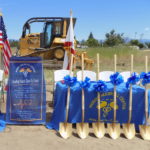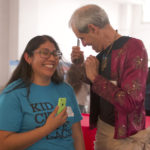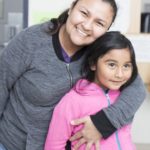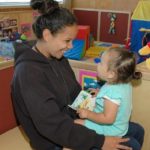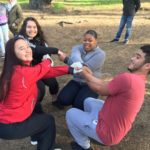Search Results for:
Modoc Medical Center Breaks Ground on New Hospital
Vesper Society believes in a simple idea: a just society begins when everyone is well. To improve the health and well-being of a community, we partner with community hospitals and clinics and support their programs. Located in the rural northeastern portion of California, Modoc Medical Center (MMC) serves the residents of Alturas and the surrounding area, covering about 4,500 square miles. The geographic reach of the hospital district is significant, and MMC represents the only local option for hospital services in their frontier community. Vesper supports MMC’s efforts to provide telehealth services for residents in this remote area and has funded care coordinators focused on reducing health disparities within the community related to socio-economic makeup and age-related chronic conditions of patients. We celebrate MMC on their new facility project that will replace their current hospital. Many community members, hospital staff, hospital partners, and collaborating agencies attended the June 2018 groundbreaking ceremony and celebration. The new hospital will replace the current hospital, built in 1949, that is located within the 100-year flood plain. It will be seismically compliant and designed to accommodate effective and efficient delivery of healthcare. The new facility will be 47,000 square feet and will include an eight-bed critical access hospital, operating room, emergency room, hospital pharmacy, radiology department, laboratory, clinic, retail pharmacy, ambulance garage, maintenance shop, and space for support services and administrative offices. The project will unfold in two phases: Phase I, preliminary site work, is underway and will be completed in Fall 2018. Modoc Medical Center CEO Kevin Kramer shared that they are excited to work with White Bear Construction on Phase I and that using local resources is important to the administration. Phase II will begin in Spring 2019 with Swinerton Builders beginning construction. The anticipated completion date is Fall 2020, and MMC... Read More
The Urban Foundation’s annual “Ultreya!” celebrates college graduates
Vesper Society is committed to improving the well-being of youth. As a child in a single-parent household, Rodrigo Gonzalez wanted to get a job to help his mother pay rent. He was too young to work, so his dream was to graduate from college, get a job, and buy his mother a house so that she would no longer have to over work. Sadly, Rodrigo’s mother passed away during his senior year in high school. Rodrigo’s plans could have crumbled. (Photo caption: Kid City alumna Frances Melchor (UCLA, 2017) with honoree and VIP volunteer Herley Jim Bowling. Photo by Ashley Kruythoff.) Thankfully, the Los Angeles United Methodist Urban Foundation’s Kid City Hope Place program (Kid City) recognizes the problem of educational inequity and severe economic hardship among the communities it serves in downtown and south central Los Angeles. With programs in leadership development, music and arts, college access, and college completion, Kid City provides mentoring, college knowledge, high-level math tutoring, and guidance through admissions and financial aid applications. With support from Kid City, friends, and family, Rodrigo says he “managed to go through the pain and continue hitting the books. I was also able to finish my college applications during that time. I never gave up because I want to honor my mom. The way she had to struggle on a daily basis taught me to never give up.” Rodrigo graduated from California State University, Northridge in May 2018. Graduations are family events. The first-generation college-bound and college-going students at Kid City Hope Place refer to the program as a “second home” or “second family,” so it’s natural to mark their college graduations with ceremony and celebration, and to offer words of encouragement and wisdom. The Urban Foundation’s annual “Ultreya!” celebration honors the difficult journey traveled by Kid City’s... Read More
La Clinica Oakley Specialty Mental Health Moves to New Site
Vesper Society is committed to improving the health and well-being of youth and families. One way we do this is by supporting La Clínica de La Raza in Contra Costa County. Throughout its 47-year history, La Clínica de La Raza, Inc. (La Clínica) has delivered health care services in a culturally and linguistically appropriate manner to most effectively address the needs of the diverse population it serves. In 2017, La Clínica served 86,884 patients and provided 360,570 patient visits in 35 sites in Alameda, Contra Costa, and Solano counties in California. La Clínica’s behavioral health department was founded in 1973 in response to the community’s need for culturally appropriate behavioral health services for the Latino community and offers three levels of mental health services: Prevention and Early Intervention, Integrated Behavioral Health, and Specialty Mental Health. La Clínica’s behavioral health services have expanded considerably over time. La Clínica’s Casa del Sol, located in Oakland’s Fruitvale district, was once La Clínica’s sole Specialty Mental Health site. In 2012, with the support of Contra Costa Behavioral Health Services, La Clínica opened the Oakley Specialty Mental Health Clinic. Originally housed within Oakley Medical, clinicians at Oakley Specialty Mental Health Clinic often had limited space to see clients. In early 2018, Vesper Society supported their move to a new site just across the street from their previous location, which allowed for more time and service offerings. The new site, Casa de Luz (House of Light), was named in honor of the spirit that La Clínica’s late Behavioral Health Director, Leslie Preston, brought to La Clínica’s Behavioral Health Program and her instrumental role in establishing an independent site for Oakley Specialty Mental Health. Leslie was always a bright light to the clinic staff and the children and families of Oakley Specialty Mental Health, and over... Read More
First 5 Humboldt Coordinates Response to Childhood Trauma
Vesper Society is committed to finding long-term solutions that help leaders and organizations in rural areas improve the well-being of their children and communities. In November 1998, California voters passed Proposition 10, the “Children and Families Act of 1998” initiative. The act instituted a tax on cigarettes and other tobacco products to provide funding for early childhood development programs. Revenues generated from the tobacco tax must be used to enhance the early growth experiences of children, enabling them to be more successful in school and ultimately to give them an equal opportunity to succeed in life. When voters passed Proposition 10, they launched a new model of responsive public agencies. In each of the 58 counties, the First 5 Commission was formed—made up of local community leaders, experts, and advocates. Complementing First 5’s efforts, the California Children and Families Foundation (CCFF), a nonprofit public benefit corporation, conducts regional and statewide projects that assist county commissions and the children and families they serve. With support from Vesper Society, CCFF funds First 5 Humboldt ACES/Resilience Project. Adverse childhood experiences (ACES)— stressful traumatic experiences and household dysfunction—are one of the greatest public health crisis facing Humboldt County. Growing up with family members with substance abuse disorders, witnessing domestic violence, child abuse, and neglect are some examples of ACES. Research shows that when children are exposed to chronic stressful events, their ability to cope diminishes and this can lead to substance abuse and behavioral problems. Humboldt and Mendocino counties have the highest percentage of residents in California with four or more ACES. Research shows that a person who has experienced four or more ACES is 12 times as likely to attempt suicide, ten times more likely to use injection drugs, five times more likely to suffer from depression, and twice as likely to have a... Read More
FACES for the Future – Hayward Students Attend Retreat
Vesper Society is committed to improving the well-being of youth. So, we link arms with leaders and organizations creating long-term solutions in their communities. FACES for the Future at St. Rose Hospital in Hayward, CA, was founded in 2007 as a two-year program to motivate and prepare underrepresented youth for careers in the health industry. Partnering with the Eden Area Regional Occupations Program in Hayward, FACES provides high school students with unique opportunities to learn from healthcare professionals in various hospital settings and explore career options in the health professions. Students benefit from academic enrichment opportunities, including individualized tutoring and college preparation activities, leadership training, and multi-faceted psychosocial support services, including one-on-one case management. The program also assists FACES alumni with job and internship placements, academic and career guidance, and ongoing life coaching. In December 2017, the students of the FACES for the Future-Hayward program had the opportunity to attend an overnight retreat in San Francisco. The retreat, offered in partnership with St. Rose Hospital Foundation, Vesper Society, San Francisco State University, and Vision Quilt, taught the students about public health issues and to develop their skills as advocates for their own communities. And of course, they had a lot of fun, too! Students began their retreat by participating in a Ropes Course at Fort Miley where they cheered each other on, spot-checked their peers, and faced their fears of heights. Later that day, students visited at San Francisco State University (SFSU) and were welcomed by Dr. Leticia Marquez-Magana, Professor of Cell and Molecular Biology, and Director of the Health Equity Research Laboratory. Dr. Marquez-Magana taught them about the field of Public Health, and got them thinking about the reality of health disparities and social determinants of health. The students completed exercises to understand how they can influence the... Read More

